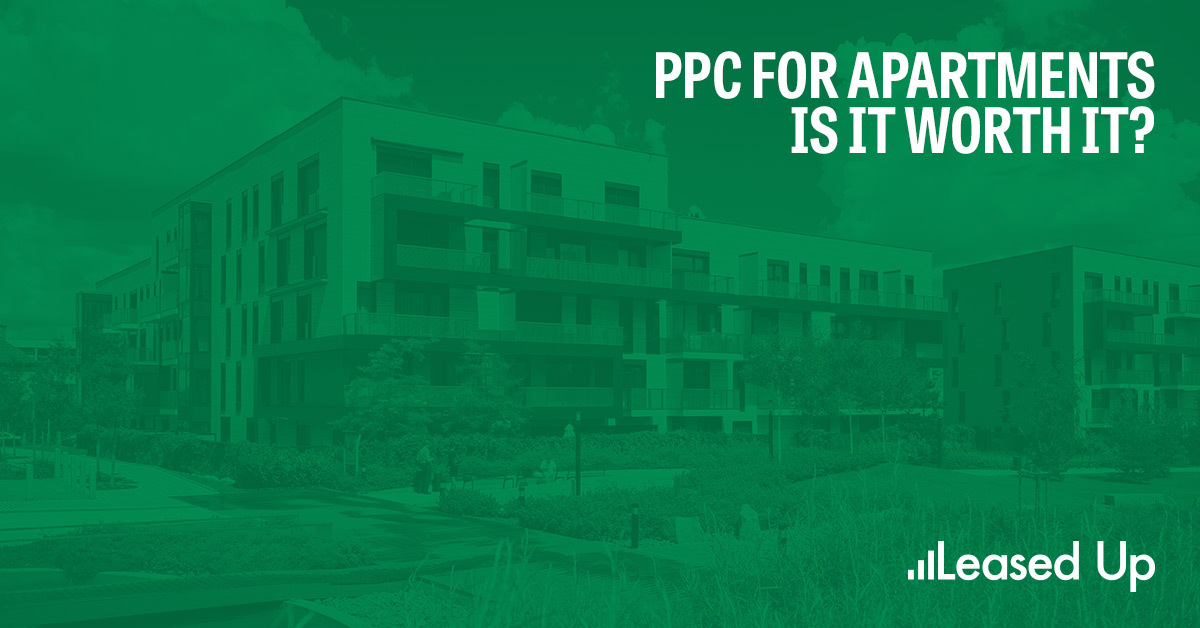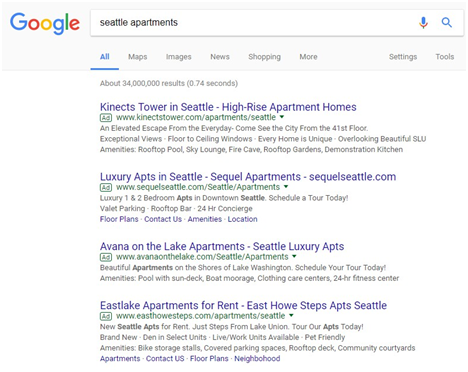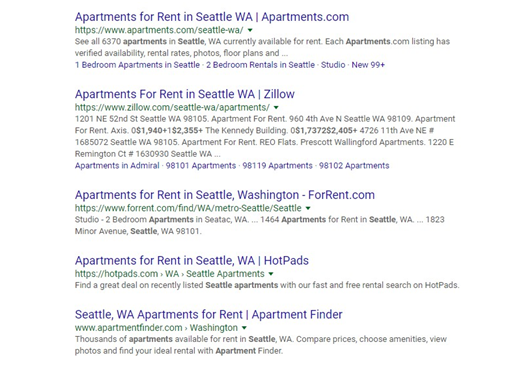PPC For Apartments: Is it Worth It?

Is PPC for Apartments worth it? The answer is it depends. For any industry, the choice to run PPC, how your run it, and how you integrate it with your existing SEO campaign, all really depend on your business and it’s goals. PPC, or pay-per-click advertising is exactly what it sounds like: paying advertisers to service links to your website by the click. The three most widely utilized and effective PPC platforms are Google AdWords, Yahoo! Bing Network, and Facebook. For the purposes of apartment communities, where the main goal is to quickly lease units, a well-run PPC campaign makes a lot of sense. PPC is an effective way to quickly generate traffic, but it’s not the only way.
SEO vs PPC
SEO
Search engine optimization tailors your website to be search engine friendly for given keywords. There are a number of factors, which have been well documented in other blogs, that, if well attended to, will boost rankings. It’s also widely understood that the top three positions in search results attain well over 50% of the traffic. With the right strategy, and the right insight into your business, your website will appear toward the top of the results page for queries containing valuable keywords. It takes time for an optimized website to get up and running, but, due to the way search engine algorithms work, there’s virtually no limit to SEO’s ROI. higher rankings continue to yield business for years to come.
PPC
PPC is a much more immediate way of generating qualified traffic. As soon as PPC services are activated, they’ll start running, and as long as you're targeting is well-researched and precise, and your ads are well written, there’s no reason that you shouldn’t be seeing results right away. However, bidding on choice keywords is competitive and can make PPC extremely costly, and thus ineffective, in the long-term. ROI for PPC subscribers depends significantly on the conversion rate per click, which means you need to strike a balance between the keywords you're targeting (and their costs) with the user’s you’re trying to capture.
For example, in the apartment space, where keyword targeting can be very broad, you’ll see communities shell out a ton of ad spend in order to rank for extremely competitive keywords. Let’s take a look at the search results for “Seattle Apartments,”:

You’ll notice that the top 4 ad spots are from individual businesses that have each spent a ton of money to have their ad appear there. How do we know they spent a ton? Let’s take a look at the top organic results from the same search:

The top organic results for that search query are all occupied by very large and well-trafficked apartment listing sites, which any individual community is going to have a hell of a time outranking. But, to achieve that top result for such a broad keyword, you have to shell out.
PPC is a Short-Term, Quick Way to Build Traffic, SEO is a Long-Term, “Slower Burn” Method of Building Traffic and Visibility
As we note above, PPC will bring in traffic as soon as service is activated. That traffic isn’t guaranteed to last. Search engines list results based on a number of factors, but one of them is site popularity. PPC links are not tracked for popularity by search engines. If they were, we’d ultimately only ever see advertised websites in our search results.
SEO on the other hand works in the long-term and ultimately has a higher ROI than pay per click advertising. SEO generates organic traffic and that traffic increases exponentially, provided that your perform maintenance to keep your website relevant. As they generate more traffic, they move up in search rankings, thus generating more clicks.
Be Careful, Targeting the Wrong Keywords Can Cost You
Often, the targeting the most obvious keywords in your pay per click advertising campaign can be a mistake. As per our example above, using PPC for apartments and targeting the keywords “Seattle Apartments” will not be productive. Obvious keywords are going to be popular and dominated by businesses that can afford top spots. More than likely, you won’t be able to outbid deeper pockets for those top spots, so your PPC campaign won’t reach your targeted user at all.
So, is PPC Right for Marketing an Apartment Community?
Whether or not PPC is right for marketing an apartment community depends on your
goals:
- Budget: PPC can be an effective, albeit expensive way to market an apartment community. That also depends on the area you’re in. PPC keywords in competitive rental markets like Seattle, San Francisco or New York will be expensive and dominated by tough-to-outbid competitors, unless you target more specific, long-tail keywords.
- Timeline: Pay per click advertising is one of the fastest ways to generate traffic to your apartment community’s website. If you need to lease units ASAP, PPC is a great method for accomplishing that goal. If your timeline is longer, using PPC in concert with other marketing tactics could prove a highly effective strategy.
- Size of your building: ROI when using PPC for apartments will depend significantly on how many units you can lease. If you only need to fill a four unit bricker, might yield poor ROI. On the other hand, fewer units could also mean a shorter PPC campaign.
- Competitiveness of area: Search results for more competitive rental markets will be dominated by national listing services, communities managed by national groups, and very wealthy apartment communities. Unless you yourself fall into one of those categories, it’s unlikely that you’ll be able to outbid your competitors for top result rankings. Your may not even make the first page of results. Having said that, if you do the research, and you know how to run an effective PPC campaign, you could target specific, niche markets that are often overlooked or entirely missed by the bigger fish. Remember, it all depends on your goals, and with PPC, your goal is never to be in the #1 spot, it’s to service ads to relevant, interested users….and get Leased Up!
Ultimately, PPC isn’t the be-all-end-all of an effective marketing strategy. However, PPC for apartments is an effective tactic in marketing a community, especially when used with other long-term tactics like SEO.




